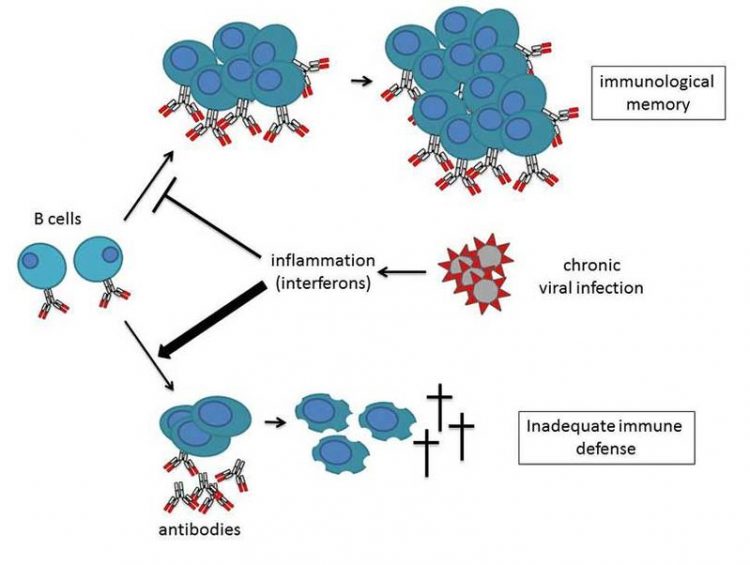Inflammation Triggers Unsustainable Immune Response to Chronic Viral Infection

Under the influence of interferons, chronic viral infections cause strong inflammation. This causes the B cells to initiate an inadequate immune response. Department of Biomedicine, University of Basel
In the course of an infection or upon vaccination, specialized cells of our immune system, so-called B cells, produce antibodies that bind viruses and inactivate them. In the context of chronic viral infections such as HIV or hepatitis C virus, however, antibody production by B cells is quantitatively inadequate and starts too late.
A team of scientists headed by Prof. Daniel Pinschewer at the Department of Biomedicine, University of Basel, reports that the inadequate antibody response to chronic viral diseases is due to the strong inflammatory reaction upon infection. While most pronounced at the onset of an infection, inflammation can persist for decades, especially in HIV/AIDS.
Hasty immune response lasts only short-term
Under the influence of inflammatory messengers, so called interferons, B cells produce as many antibodies as they possibly can. Unfortunately, this hasty response occurs at the expense of sustainability. B cells that turn on antibody production too quickly lose their potential to proliferate and die shortly thereafter. As a consequence, the immune response takes an impetuous start but subsides rapidly.
The scientists assume that this panic reaction of B cells reflects a mechanism ensuring an optimized response to acute life threatening infections. In the context of chronic infections, however, the battle is not decided within a matter of days, but rather only after months or years. Under these circumstances, the hasty reaction of our body seems inappropriate and may actually favor the virus.
Cornerstone for new vaccines
For viral diseases such as HIV or hepatitis C protective vaccines remain unavailable. The scientists are hopeful that the discovery of this fundamental mechanism may provide a basis to improve vaccination strategies against chronic viral diseases.
Original article
Fallet et al.
Interferon-driven deletion of antiviral B cells at the onset of chronic infection
Sci. Immunol. 1, eaah6817 (2016) | doi: 10.1126/sciimmunol.aah6817
Further information
Daniel Pinschewer, University of Basel, Department of Biomedicine, Tel. +41 61 267 32 70, email: daniel.pinschewer@unibas.ch
http://www.unibas.ch/en/News-Events/News/Uni-Research/Inflammation-Triggers-Unsu…
Media Contact
All latest news from the category: Health and Medicine
This subject area encompasses research and studies in the field of human medicine.
Among the wide-ranging list of topics covered here are anesthesiology, anatomy, surgery, human genetics, hygiene and environmental medicine, internal medicine, neurology, pharmacology, physiology, urology and dental medicine.
Newest articles

A new puzzle piece for string theory research
Dr. Ksenia Fedosova from the Cluster of Excellence Mathematics Münster, along with an international research team, has proven a conjecture in string theory that physicists had proposed regarding certain equations….

Climate change can cause stress in herring larvae
The occurrence of multiple stressors undermines the acclimatisation strategies of juvenile herring: If larvae are exposed to several stress factors at the same time, their ability to respond to these…

Making high-yielding rice affordable and sustainable
Plant biologists show how two genes work together to trigger embryo formation in rice. Rice is a staple food crop for more than half the world’s population, but most farmers…



